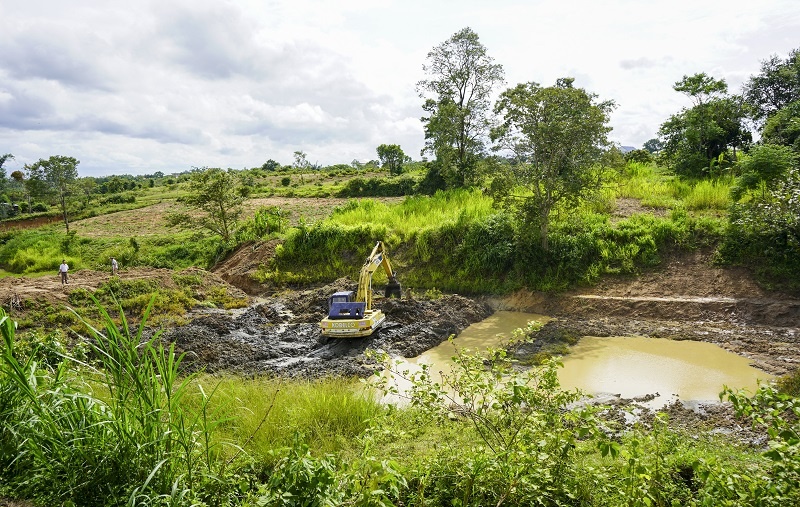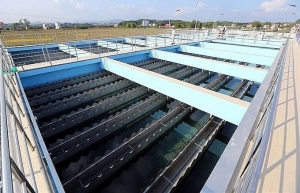Over 120 climate-resilient ponds enhance water security for farmers
 |
| A shared pond being dug in the Central Highlands province of Dak Lak |
The Strengthening the Resilience of Smallholder Agriculture to Climate Change-Induced Water Insecurity in the Central Highlands and South-Central Coast Regions of Vietnam project aims to improve water security and safeguard the livelihoods of smallholder farmers in the area.
By 2026, about 1,100 climate-resilient ponds will have been constructed and handed over, ready to be carefully managed and operated.
Among them, 106 ponds have already been completed and put into operation, with a further 15 ponds currently under construction. These are expected to be completed soon, ready to gather water in time for this year's rainy season. They will strengthen the project's impact and enhance water access for farmers.
Each pond is designed to efficiently store rainwater and surface run-off while providing a sustainable water source to farmers during the local annual dry season, significantly reducing the likelihood of the water shortages due to drought and climate change that take place regularly in the project area.
Irrigation experts use rainfall models to calculate the water balance, considering multiple factors, such as the maximum use of available water resources, geographical conditions, climate risks, and local experience. This method ensures that the ponds are built to withstand different climate scenarios, assuring water supply for the long term.
In addition, the ponds' design considers innovative features to minimise water loss and avoid sedimentation, promoting sustainable water management practices. For example, biological techniques and nature-based solutions – such as planting suitable vegetation around banks to increase resilience and cost-effectiveness – are also incorporated to supplement traditional knowledge.
One of the critical aspects of this project is its community-centred approach. Through pond use management groups, farmers, especially women and ethnic minorities, play a key role. They closely supervise the construction, operation, and maintenance, ensuring the long-term viability of the project.
By participating in training and capacity-building sessions, these farmer-led groups will ensure the ponds are utilised optimally and promptly address any technical challenges, amplifying the positive impact on the local communities.
Implemented by the United Nations Development Programme, the Ministry of Agriculture and Rural Development, and the people’s committees of the provinces of Dak Lak, Dak Nong, Khanh Hoa, Ninh Thuan, and Binh Thuan, the project’s innovative approach and collaborative community engagement set a compelling example for benefit-sharing and sustainable water utilisation and management practices in the face of climate change and the extreme El Nino phenomena.
As these ponds continue to support local farmers and strengthen their resilience, they contribute to a more secure and prosperous future in Vietnam’s agricultural heartland.
 | Vietnam faces challenges in ensuring water security With a growing population, increasing demand for water and the negative impacts of climate change, Vietnam faces major challenges in ensuring water security. |
 | Water neutral – La Vie sets ambitious water sustainable target La Vie LLC, a member of Nestlé Group, has just announced its goal to replenish 100 per cent of its water used in production by 2025, aiming to protect watershed and reach a net positive water impact locally. Bich Ngoc talked with Fausto Tazzi, CEO of La Vie, about the company’s water stewardship efforts in Vietnam and their plans to achieve the ambitious targets in the coming time. |
What the stars mean:
★ Poor ★ ★ Promising ★★★ Good ★★★★ Very good ★★★★★ Exceptional
 Tag:
Tag:
Related Contents
Latest News
More News
- Trung Nam-Sideros River consortium wins bid for LNG venture (January 30, 2026 | 11:16)
- Vietnam moves towards market-based fuel management with E10 rollout (January 30, 2026 | 11:10)
- Envision Energy, REE Group partner on 128MW wind projects (January 30, 2026 | 10:58)
- Vingroup consults on carbon credits for electric vehicle charging network (January 28, 2026 | 11:04)
- Bac Ai Pumped Storage Hydropower Plant to enter peak construction phase (January 27, 2026 | 08:00)
- ASEAN could scale up sustainable aviation fuel by 2050 (January 24, 2026 | 10:19)
- 64,000 hectares of sea allocated for offshore wind surveys (January 22, 2026 | 20:23)
- EVN secures financing for Quang Trach II LNG power plant (January 17, 2026 | 15:55)
- PC1 teams up with DENZAI on regional wind projects (January 16, 2026 | 21:18)
- Innovation and ESG practices drive green transition in the digital era (January 16, 2026 | 16:51)






















 Mobile Version
Mobile Version